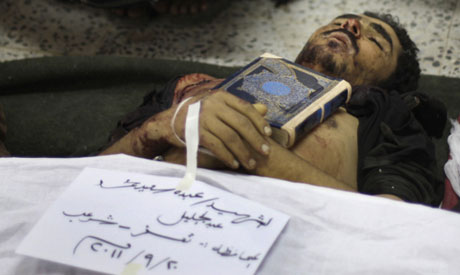
Islam's holy book, the Quran, is placed on the body of a Yemeni anti-government protestor who was killed during recent clashes with security in Sanaa, Yemen, on Tuesday. Writing in Arabic reads: Martyr Abdou Saeed Mohammed, Taiz"(AP).
The fighting erupted in Achrine street, whose residents include Yemeni Vice President Abdrabuh Mansur Hadi, who had declared the truce late on Tuesday, the witnesses told AFP.
The gunfire gained in intensity after it began sporadically, while shells smashed into buildings where snipers had taken up positions, according to the witnesses.
The renewed fighting comes as protesters prepared to bury those killed in the three bloodiest days since mass protests calling for embattled President Ali Abdullah Saleh to resign erupted in January.
Medics said at least 76 people, mostly unarmed protesters, died and hundreds were wounded since Sunday in the clashes between dissident troops and those loyal to Saleh, during which security forces also used live fire to disperse crowds.
Earlier, Republican Guard troops commanded by Saleh's son Ahmed shelled posts held by troops of the First Armoured Brigade loyal to dissident General Ali Mohsen al-Ahmar around Change Square, epicentre of the protests, witnesses said.
Most of the casualties, however occurred when Saleh's forcers fired on tens of thousands of protesters as they moved from Change Square, where they have been encamped since February, further into the heart of the capital, according to witnesses and medics.
The fighting had died down on Tuesday night after the defence ministry said Hadi had given "strict orders for a rapid ceasefire in the capital and that government forces were obeying."
An opposition official said the dissident troops had been observing a ceasefire since noon on Tuesday to "foil the plans of the band that wants a military escalation."
It was not immediately clear what sparked Wednesday's clashes nor was there any word on any casualties.
Protesters meanwhile have called for a "mass" funeral procession later Wednesday to honour their dead, setting the stage for further confrontations.
In a statement released by the Youth Revolutionary Organisation, the group said the procession would begin just after noon prayers and follow the path from the mosque to a cemetery near Change Square.
On the diplomatic front, foreign officials speaking to AFP on condition of anonymity said a meeting between Hadi and UN and regional envoys was expected later Wednesday.
UN Yemen envoy Jamal Benomar and Gulf Cooperation Council (GCC) chief Abdulatif al-Zayani arrived in Yemen Tuesday in the hopes of finalising agreements on the transfer of power from Saleh to his deputy.
Opposition forces have said however they would not negotiate while blood is running in the streets of the capital.
In Washington, State Department spokeswoman Victoria Nuland said "the United States continues to support the Yemeni people's aspirations for a peaceful and orderly transition that is responsive to their aspirations for peace, reconciliation, prosperity and security.
"A political solution is the best way to avoid further bloodshed," she said while attending meetings with Secretary of State Hillary Clinton on the sidelines of the UN General Assembly in New York.
"We remain hopeful that an agreement will be reached that leads to the expeditious signing of the GCC political transition initiative."
Saleh, who has ruled Yemen since 1978, has been recovering in Saudi Arabia after a June 3 explosion at his presidential compound, but has so far refused to transfer power to his deputy or to sign the so-called Gulf Initiative.
The GCC plan, proposed last spring, calls on Saleh to step down and hand over all constitutional authorities to his deputy. In return, Saleh and his family would be granted immunity from prosecution.
However, young protesters reject the plan and call for the immediate ouster of Saleh and all members of his regime and for bringing him to justice.
The latest violence was sparked on Sunday when demonstrators, vowing to escalate their protests, marched southward along Al-Zubair Road towards Kentaky crossroad in central Sanaa.
They were met by security forces and armed civilians who opened fire on them, leaving 26 dead, medics said.
Dissident troops intervened in defence of the protesters, who managed to drive out Saleh's loyalists and security forces before setting up their own tents along the road.
On Monday, 27 people were killed in similar clashes, while another 23 died on Tuesday, medics and protest organisers said.
Five civilians were also killed in the city of Taez south of Sanaa in random shelling and gunfire by Saleh's forces, according to medics and residents there.
Short link: